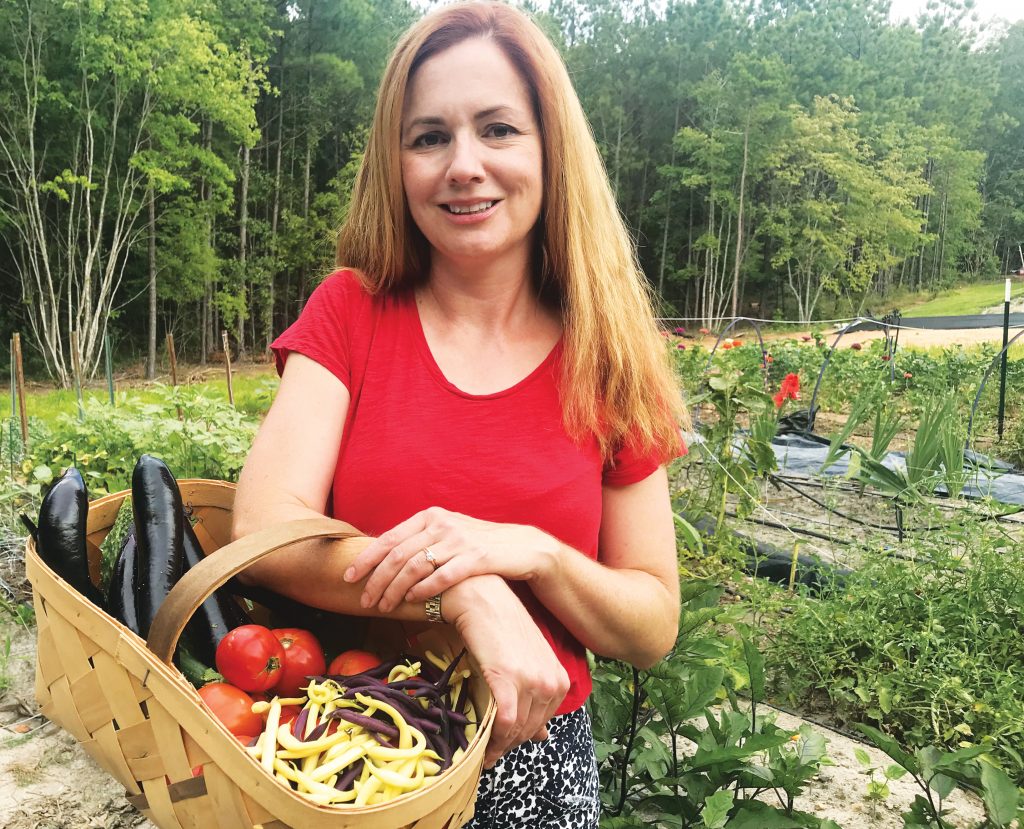BLYTHEWOOD – By July, many gardeners lose their enthusiasm for gardening when weeds, pests, and hot weather ravage the beautiful baby plants they set out into weed-free soil only a couple of months ago. I also have moments of discouragement when the crabgrass, the deer or the drought destroys my dreams of a perfect garden, but then I remember the examples of the people who taught me to grow food and flowers: they did not give up the garden no matter how difficult the circumstances. If you are a disappointed gardener, take hope from this article and plan another garden for fall.

Mary Ann Adams harvesting produce from her summer vegetable garden.
My first teacher, besides my parents, was my paternal grandmother, Goldie Layton Haynes. She lived across the cow pasture from us, and I made nearly daily visits to her home. She included my sister and I in whatever she was doing, and we learned to garden by osmosis.
Born in 1902 as the next-to-last child of eight siblings, she and her family survived by growing cotton on rented farms, and her father made extra money by clearing land with an ax and a mule. As an adult, she and my grandfather also farmed cotton with their own labor and that of their children and they sold butter, milk, eggs, and vegetables by mule and wagon in a neighboring community. Through hard work and thrifty living, my grandparents were able to purchase land and to send their children to college.
I remember helping her pull weeds, pick flowers, shell beans, and harvest corn, watermelons, and sweet potatoes. One of my favorite childhood memories is walking in the soil barefoot, which the October weather had cooled, and helping to harvest sweet potatoes that had been loosened by my father’s plow. She encircled her house with flowers and shrubs, and she dotted the yard with more beds of flowers. My aunt always marveled that even after working all day in the cotton field she still found the energy to work in the flower garden.
My maternal grandmother, Louise Hyder Henson, also taught me to garden. She spent many years working the cotton fields and peach orchards with her parents and siblings, and as an adult she and my grandfather grew most of her family’s food.
I usually saw her on Sunday afternoons, and so I wasn’t in the vegetable garden with her much, but she became agitated after sitting too long (just like I do) and would venture to the garden to pull weeds or to clip flowers. This physical activity helped her stay healthy into old age: the last time I saw her before she had the heart attack that resulted in her death, she was in the flowerbed helping me dig up plants to take to my garden.
My mother and father, as well as my aunts and uncles, also taught me to garden. I was expected to help as a child, and while their teaching might have focused mostly on “Don’t cover the seeds too deep, don’t waste the seeds, don’t leave the weeds and pull up the plant” as is necessary with all children, I learned a lot by just being with them.
One of the most important lessons I learned, and something I see new gardeners struggle with, is how to handle the inevitable disasters and failures that happen in the garden. I cope with failure, just as most people handle disappointment if they succeed at anything, not just gardening, by trying to learn from my mistakes and to try again.
If something dies, well, it might do better next year. Or maybe there is time to replant this year. Perhaps the weather became too hot or too cold or a plague of grasshoppers attacked the garden: things beyond your control killed your plants. You might have even pulled up the plants and left the weeds (I have!).
Disasters happen. And when they do, maybe someone has some plants or vegetables they will share with you. Replant. Just don’t give up.
My relatives couldn’t give up. Gardening supplied their food, and without fresh vegetables from the garden, their diets would have been severely limited to pork and cornbread. They might have suffered pellagra, the nutritional deficiency caused by a lack of green vegetables, common to many of the cotton farmers in the South who chose to plant their cotton to the doors of the house without leaving any room in the yard for food.
If you want to garden, or if you want to teach your children to garden, start planting something in whatever space you have available. I grew my first carrots in a pot on an apartment balcony. You don’t have to spend a lot of money, or any money if you have friends or relatives to give you starts of plants or seeds.
Read books, consult websites, or even better, if you have no gardening heritage from your own family, knock on the door of the neighbor with the beautiful yard and ask for some advice. I am sure he or she would enjoy helping you. Your plant-loving neighbor will also find some plants or seeds to share from their own garden, and they will help you find the perfect spot to plant them in your yard.
One book that inspired me to write this article is “Deep-Rooted Wisdom” by Jenks Farmer. The Blythewood Garden Club sponsored a talk by him in March, and I counted myself fortunate, like him, to be one of the recipients of gardening wisdom passed down through the generations.











